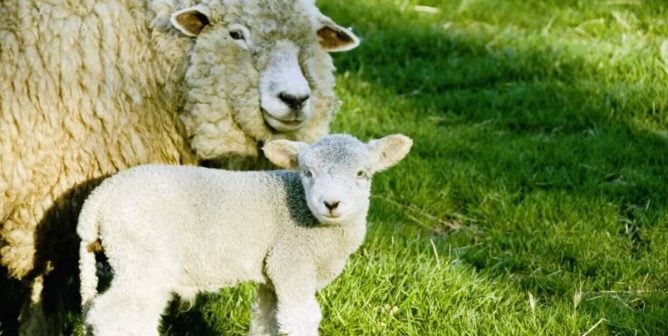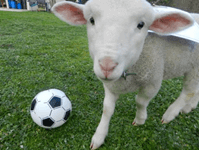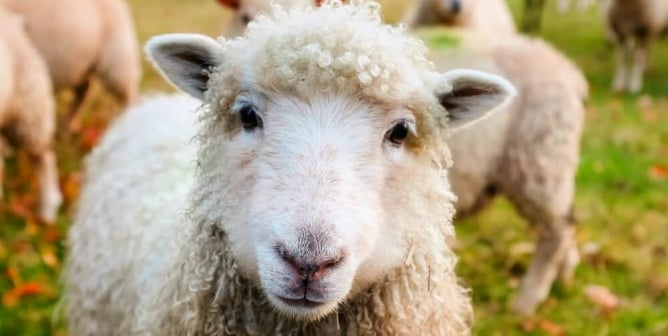Not Just Part of the Flock! (Grades K-2, English and Spanish)
This lesson plan is designed to help teachers present animal rights issues to their students. If you’re an educator, please feel free to adapt this material to fit your needs, and contact us if you need help incorporating this activity into your curriculum.
Spanish-language educators: This lesson plan is available here in Spanish.
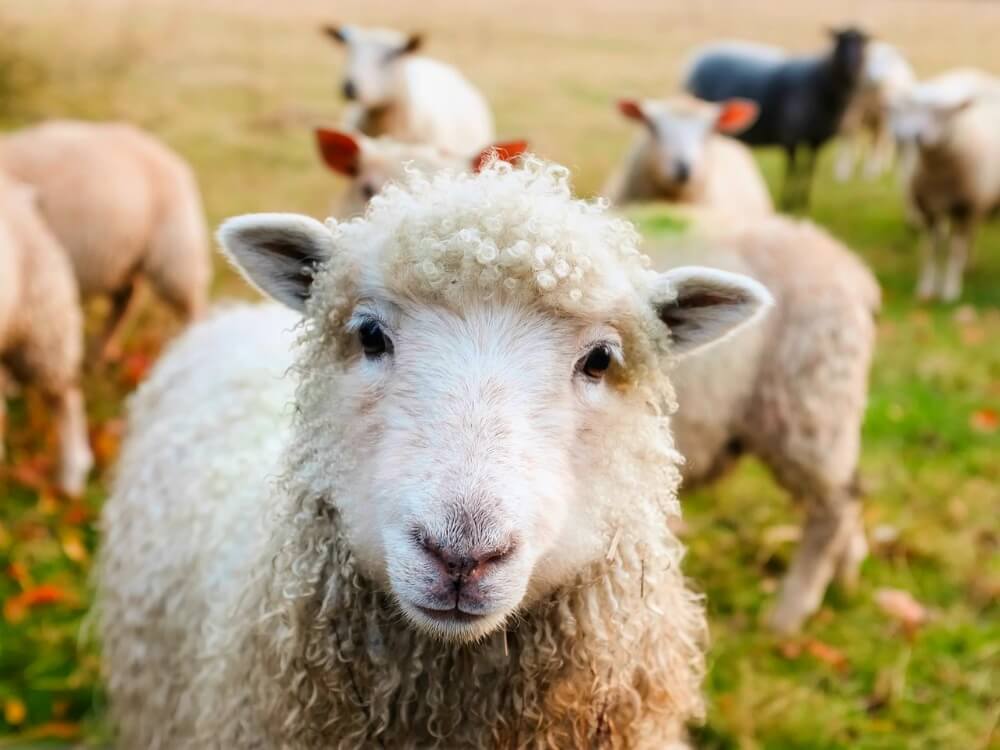
Suggested grade levels: K–2
Objectives:
- Affective: Students will be able to demonstrate an understanding of sheep as individuals and why it’s cruel to buy and wear wool.
- Cognitive: Students will be able to write opinion pieces in which they state an opinion and supply reasons for that opinion.
Background
Sheep are gentle individuals who, like all animals, experience pain, fear, and loneliness. But because there’s a market for their fleece and skin, the wool industry treats them as nothing more than wool-producing machines.
As in other industries in which animals are raised for profit, the interests of animals used by the wool trade are rarely considered. Flocks usually consist of thousands of sheep, and individual attention to their needs is virtually impossible.
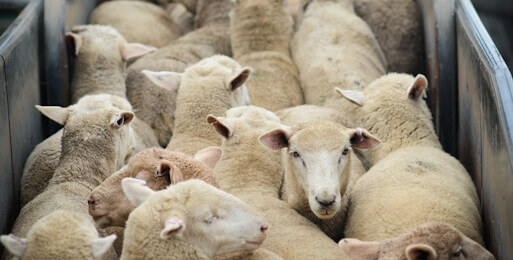
Materials
- Pictures of sheep
- Companion Animals Stories
- Our Farm: By the Animals of Farm Sanctuary by Maya Gottfried (a book of poems)
- Opinion Graphic Organizer
- Sweaters, scarves, hats, gloves, coats, or other items made from an animal-free fabric
- Shaun the Sheep bookmarks
Resources
- Mother and daughter sheep rescue video
- Hilda’s story
- Global Federation of Animal Sanctuaries listing
Key Vocabulary
- wool: hair forming the coat of a sheep, which is shorn and prepared for use in making cloth or yarn
- sanctuary: a place where someone is protected or given shelter
Motivation
Show the students pictures of sheep and ask them to act like a sheep. They’ll most likely say “baaa” and mimic walking on four legs.
Tell them that scientists have learned that sheep have many of the same feelings that humans do (e.g., fear, sadness, boredom, and happiness). Have them continue to pretend to be sheep while you read them the scenarios below. For each, they should act out the emotion that corresponds to the situation.
- Scenario 1: There’s a loud noise, and you see that other sheep are running away from something. (fear)
- Scenario 2: Someone takes you away from your family. (sadness)
- Scenario 3: You’re stuck in a crowded place with nothing to do. (boredom)
- Scenario 4: You graze all day in the warm sun with your family. (happiness)
Show the students the video of the mother and daughter sheep rescue. Ask them to identify which emotions the sheep are feeling at different points in the video (e.g., fear at the beginning and happiness at the end) and to explain their answers (e.g., after they provide a response, ask, “What makes you think so?”).
Before Reading
Ask students what an opinion is. Explain that it’s the way we think or feel about something. When we have an opinion, we usually have a reason for it. For example, we might have an opinion about whether to adopt a dog or a cat based on which animal would have the best life in our home.
Read Companion Animals Stories and explain to the students how to develop reasons for opinions based on information found in each animal’s story (e.g., “The cat would have the best life in my home, because I have time to feed and play with a cat, but my family doesn’t have enough time to provide a dog with enough exercise”).
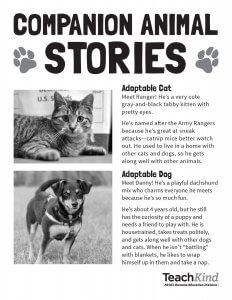
Tell students that the class will read a poem today about a sheep named Hilda and that afterwards, you’ll ask them to give their opinions about her life.
During Reading
Introduce and read the poem “Thank You” by Hilda the sheep from Our Farm: By the Animals of Farm Sanctuary. Ask students what they notice about the poem. (“Thank you” is repeated.) Why does someone say “thank you”? Why would Hilda say “thank you” so much?
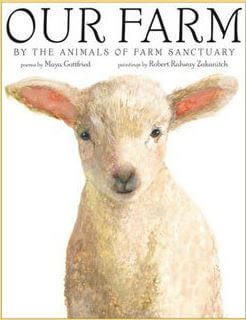
Ask students the questions below to monitor their comprehension of the poem. Chart their answers.
- Where does Hilda live? (Farm Sanctuary)
- Why would Hilda thank the wind that cools? (It helps her feel cooler when she gets hot.)
- Why would Hilda thank the moonbeams? (She enjoys the beauty of the night.)
- Why would Hilda thank the wheat and grass? (She’s thankful for healthy food.)
- Why would Hilda thank the sunflowers? (She likes to look at beautiful things.)
- Why would Hilda thank the sky above? (She enjoys her freedom.)
- Who is Hilda thanking in the last line? (The people who rescued her.)
- What does the author want us to feel about Hilda? (Possible answer: happy that she’s content and safe.)
After Reading
Turn and Talk: Ask the students whether they think that Hilda has a good life. Encourage them to support their opinions with reasons.
Show them a picture of the real Hilda. Talk about what her life was like before she went to live at Farm Sanctuary, and share her rescue story. Explain that many people raise sheep only to take their wool.
Have students respond to the following prompt: Which life was better for Hilda—before being rescued or at Farm Sanctuary? Support your opinion with reasons.
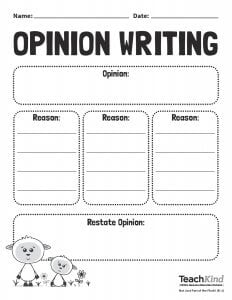
Opinion Writing Graphic Organizer
Real World Connection
Show students the wool-free garments that you brought, discuss what they’re made from, and tell them that they can keep you just as warm as items that contain wool can. Let students touch them and try them on. Explain that sheep like Hilda are mistreated on farms every day, because people buy wool items and see the sheep only as the source of hats, scarves, gloves, and coats (i.e., as objects or things, not living beings).
Ask students, “What should people do to make life better for Hilda and other sheep?” On poster paper, have them draw something that they can do to help sheep and caption the picture.
Wrap-Up
Have the students share their posters and writing. Pass out “Let Shaun Keep His Wool On“ for the students to use as bookmarks. Discuss what the slogan means, why it’s important for sheep, and what students can do to help (e.g., don’t buy wool items).
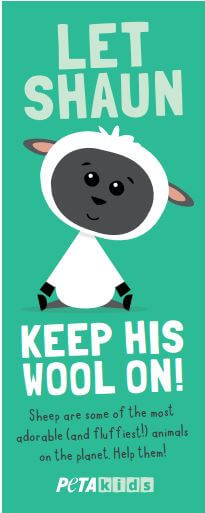
Assessment
Evaluate students’ writing for an opinion supported by reasons, and assess their posters for valid suggestions as to what they can do to help sheep.
Misperception
Some people think that wool comes from sheep who are just “getting a haircut.”
Reality
If sheep were left alone without human interference, they would grow just enough wool to protect themselves from temperature extremes. Their fleece provides them with effective insulation against both cold and heat. But in the wool industry, farmers have bred sheep to grow an unnatural amount of wool by forcing individuals with thick fleeces to mate.
Extension
- Visit an accredited farmed-animal sanctuary that cares for sheep. TeachKind cannot vouch for any facility that we’ve not visited ourselves, but this list of accredited sanctuaries is a good reference.
- Hold a fundraiser to enable students to sponsor a sheep at an accredited farmed-animal sanctuary.
- Collect items to donate to an accredited farmed-animal sanctuary that cares for sheep. Choose from the sanctuary’s wish list.
Common Core Standards Addressed
RL.K–2.1: Ask and answer questions about key details in a text.
W.K–2.1: Write opinion pieces that introduce the topic, state an opinion, and supply reasons that support the opinion.
Additional Information
Common Core Standards: © Copyright 2010. National Governors Association Center for Best Practices and Council of Chief State School Officers. All rights reserved.

